What's the best Bach Art of Fugue
Posted by: hungryhalibut on 27 April 2008
I bought a copy of this by Pierre-Laurent Aimard following a godd review, but just cannot get on with it. It seems totally passionless. Are there any recommendations? The one I have is solo piano, yet there seem to be others for larger groups and strings. All very confusing !!
Thanks
Nigel
Thanks
Nigel
Posted on: 28 April 2008 by naim_nymph
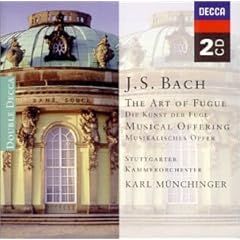
Hello Nigel,
i recently purchased this version and got completely blow-away with it,
(think George would agree too this is one to go for...)
DECCA 2CD
J.S.Bach The Art Of Fugue
Musical Offering
Stuttgarter Kammerorchestrer
Karl Munchinger
hope this helps : )
nymph
Posted on: 28 April 2008 by u5227470736789439
I agree that nymph's recomendation is splendid. I have this on CDs recorded very carefully from LPs.
The music is well served, and it unlocks the music from the potential risk of seeming passionless.
I don't care for it on the piano or the harpsichord, because the music calls for a sostenuto, and the one instrument from Bach's time that has this and yet requires no arrangement of the music, is the organ. Rubsam has made a very fine recording [on Philips I think] and Walcha [on DG Archive] made a superb recording of it, which I find satisfying to a great degree, but it can seem somewhat austere, though not heartless, or passionless.
In my view start with Munchinger and graduate to a performance on the organ.
George
The music is well served, and it unlocks the music from the potential risk of seeming passionless.
I don't care for it on the piano or the harpsichord, because the music calls for a sostenuto, and the one instrument from Bach's time that has this and yet requires no arrangement of the music, is the organ. Rubsam has made a very fine recording [on Philips I think] and Walcha [on DG Archive] made a superb recording of it, which I find satisfying to a great degree, but it can seem somewhat austere, though not heartless, or passionless.
In my view start with Munchinger and graduate to a performance on the organ.
George
Posted on: 28 April 2008 by droodzilla
Hi Nigel
I found the Art of Fugue really hard to get into - it is, after all, one of Bach's "difficult" late works, and there appears to be plenty of debate about his intentions in writing it. I too tried a piano version, and a version arranged for a small ensemble of string and woodwinds - couldn't get on with either. I finally bought a cheap organ version, performed by Andre Isoir:
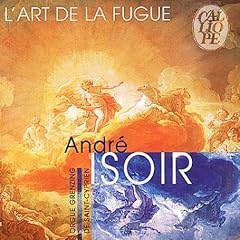
And really enjoyed it - the work just seems to make much more sense on an organ. A few months ago, I bought the Walcha version that George recommends:
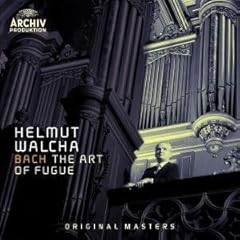
It's far more austere than Isoir, but has great artistic integrity. It's certainly not passionless - unless the expression of deeply held spiritual conviction through music can be called passionless.
Good luck, whatever you try next!
Nigel
I found the Art of Fugue really hard to get into - it is, after all, one of Bach's "difficult" late works, and there appears to be plenty of debate about his intentions in writing it. I too tried a piano version, and a version arranged for a small ensemble of string and woodwinds - couldn't get on with either. I finally bought a cheap organ version, performed by Andre Isoir:

And really enjoyed it - the work just seems to make much more sense on an organ. A few months ago, I bought the Walcha version that George recommends:

It's far more austere than Isoir, but has great artistic integrity. It's certainly not passionless - unless the expression of deeply held spiritual conviction through music can be called passionless.
Good luck, whatever you try next!
Nigel
Posted on: 28 April 2008 by Tam
Walcha, is a master of Bach's keyboard works (be they on the organ or harpsichord). There is no shortage of debate as to which instrument Art of Fugue should be played upon, and others will be better able to explain it. However, Walcha became convinced that it was intended for the organ and he makes a very convincing case.
Out of the catalogue for far too long, this has recently been rereleased and comes coupled with various other organ works from Walcha's second (stereo survey).
An interesting bit of trivia. This was DG's first stereo recording (made in 1956, though not released until 1960).
regards, Tam
Out of the catalogue for far too long, this has recently been rereleased and comes coupled with various other organ works from Walcha's second (stereo survey).
An interesting bit of trivia. This was DG's first stereo recording (made in 1956, though not released until 1960).
regards, Tam
Posted on: 28 April 2008 by JamH
I like this version ....

for string quartet

for string quartet
Posted on: 28 April 2008 by u5227470736789439
quote:Originally posted by Tam:
Walcha, is a master of Bach's keyboard works (be they on the organ or harpsichord), [and he] became convinced that it was intended for the organ and he makes a very convincing case.
...
An interesting bit of trivia. This was DG's first stereo recording (made in 1956, though not released until 1960).
regards, Tam
Dear tam,
Not only a convincing one, but one that seems not to have dated at all. Somehow if one did not know the recording was over fifty years old, you could be forgiven for thinking this was the recorded work of an current day artist of the first water, and recorded in modern sonics, again of the first water...
The trouble really is how to do it better. Its austerity becomes an advantage from the second listen onwards, and a huge asset as acquaintance grows through respect to an understanding!
ATB from George
Posted on: 28 April 2008 by hungryhalibut
It seems that the Walcha wins the day, and has now been purchased for the pricely sum of £6.74. The Aimard was undoubtedly a technical tour de force, but sort of came and went while leaving no impression. I can really enjoy Angela Hewitt's Well Tempered Clavier, for example and become totally immersed, yet the Aimard Fuge is strangely mechanical. There is a version of the Art of Fugue on Opus 111 by the Concerto Italiano which looks very interesting - but the only copies I have found are really expensive.
But no Bach tonight - the new Portishead has arrived!
Nigel
But no Bach tonight - the new Portishead has arrived!
Nigel
Posted on: 28 April 2008 by pe-zulu
Halibut,
No recording of The Art of Fugue is "the best", but I would like to second George´s recommendation of Walchas version. From a pure musical viewpoint his is one of the most rewarding versions, played with great passion and devotion and with an exceptionally transparent part playing - a most important thing in a fugue. From a musicological viewpoint he represents the "new objectivity" movement from the middle part of the 20th century. So you will get no HIP here, - actually Walcha rejected obstinately the HIP movement to his death in 1991. His philosophy as to Bach is displayed in this quote (taken from Wikepedia):
"Bach opens a vista to the universe. After experiencing him, people feel there is meaning to life after all."
And you are all the time aware of this philosophy in his playing.
His recording of the AoF breaks off where the unfinished Fugue (supposed Contrapunctus 14) ends. Later Walcha composed a conclusion for this fugue, which he recorded ca. 1970, but this is not part of the recording of the AoF in question. It serves to honor his deep understanding of Bach´s counterpoint, that this is indeed a beautiful and stylish addition.
If you can read musical notation, you are in my opinion better served by reading the score while listening to Walchas version, than you are by listening to a chamber ensemble version.
I agree with your words about the Aimard version. A great dissapointment.
Regards,
Poul
No recording of The Art of Fugue is "the best", but I would like to second George´s recommendation of Walchas version. From a pure musical viewpoint his is one of the most rewarding versions, played with great passion and devotion and with an exceptionally transparent part playing - a most important thing in a fugue. From a musicological viewpoint he represents the "new objectivity" movement from the middle part of the 20th century. So you will get no HIP here, - actually Walcha rejected obstinately the HIP movement to his death in 1991. His philosophy as to Bach is displayed in this quote (taken from Wikepedia):
"Bach opens a vista to the universe. After experiencing him, people feel there is meaning to life after all."
And you are all the time aware of this philosophy in his playing.
His recording of the AoF breaks off where the unfinished Fugue (supposed Contrapunctus 14) ends. Later Walcha composed a conclusion for this fugue, which he recorded ca. 1970, but this is not part of the recording of the AoF in question. It serves to honor his deep understanding of Bach´s counterpoint, that this is indeed a beautiful and stylish addition.
If you can read musical notation, you are in my opinion better served by reading the score while listening to Walchas version, than you are by listening to a chamber ensemble version.
I agree with your words about the Aimard version. A great dissapointment.
Regards,
Poul
Posted on: 28 April 2008 by fred simon
I love this performance by the Keller Quartet:
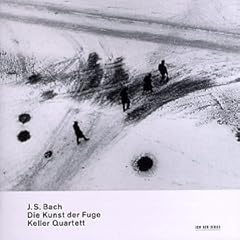
String quartet without vibrato. Sublime.
All best,
Fred
Posted on: 29 April 2008 by FlyMe
I love this undersated playing - only excerpts. Fine when he plays the organ as you can not hear him singing along! Second half of the disc contains a piano version - complete with Glenn Gould singing.


Posted on: 29 April 2008 by naim_nymph
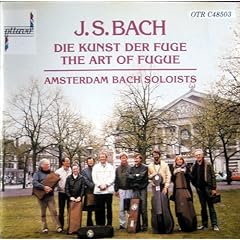
About a month ago, BBC Radio 3 played a track from this Amsterdam Bach Soloists album...
What i heard (from car audio) sounded very good indeed imho, i've tried but been unable to obtain a copy.
On the 'Ottavo' label and from amazon - curently unavailable.
nymph
Posted on: 29 April 2008 by u5227470736789439
Dear Fred,
The Julliard Quartet, used a specially strung viola, tuned a fifth lower [ie. one octave lower than the violin] to allow for the avoidance of transpositions, which can produced inverted chording. Is this issue addressed in the Keller Quartet performance?
George
The Julliard Quartet, used a specially strung viola, tuned a fifth lower [ie. one octave lower than the violin] to allow for the avoidance of transpositions, which can produced inverted chording. Is this issue addressed in the Keller Quartet performance?
George
Posted on: 01 May 2008 by fred simon
George, the extensive liner notes don't mention the transposition issue directly as far as I can tell, although there is this from the discussion of the first fugue:
Contrary to one of the more frequent received opinions, the "tonal" answer at the fifth is not compulsory here; though it would aid tonal clarity, it is an arbitrary measure, which Bach frequently suspended.
I'm sure you know the work better than I; this may or may not be related to the issue you raised.
The notes do mention the relative lack of vibrato, which I like, and the decision to vary the tempi more than is commonly done, which I also like; some are quicker but many are slower.
In any case, it's a sublime and unique performance.
All best,
Fred
Posted on: 01 May 2008 by u5227470736789439
Dear Fred,
I am aware of this issue from actually reading the notes to the Julliard performance. I think we have, on the other hand to be careful of simply playing fast and loose with Bach in recordings. Of course Bach was forced to be pragmatic on occasion in performance. But that does not mean we should accept this in recordings. I am unhappy to find Bachs intervals in such perfectly written music inverted if the lower note is transposed up the octave, if the higher note is less than an octave interval above thew lower [intended] note. For others this may not seem a big issue, I do agree.
But if the Keller recording pleases, then that is fine enough as an introduction, if not perhaps the last word in my view. With such music, the first recording is unlikely to be the last!
I suppose I do know the music quite well by now! I found it fairly indigestible for many years when played on a harpsichord. I got the Suprafon set under Milan Munclinger [not the Decca set under Munchinger] and found that this entirely anachronistic arrangement for chamber group brought the music out with much serious beauty, but it took listening to the Munchinger set mentioned by nymph to make very clear the long line of expression and human warmth which runs through the music - through each fugue in turn - and shown in a different refraction in each.
To be honest I have not found a performance that rivals Walcha on the organ, and if you do not know this performance, it is fair to point out that he does not take the chance to play loud, but registration is designed for clarity of the lines of counterpoint. This restraint may initially seem austere, but it is anything but after first acquaintance. It is clearer and more differentiated than the instrumental versions, and was significantly easier to follow in a sort of listening into the music way, than the Julliard, which I could confess that I did not enjoy one little bit! I adore the Haydn Quartets and Beethoven’s and Schubert’s, but this seemed not so much the old testament of quartet music, as something a little odd. I would agree that this is entirely my reaction, but the sound world, while secondary in this music is still relevant I think.
It is to my considerable sadness that I still do not own a score, which would certainly have made learning the music much easier.
ATB from George
I am aware of this issue from actually reading the notes to the Julliard performance. I think we have, on the other hand to be careful of simply playing fast and loose with Bach in recordings. Of course Bach was forced to be pragmatic on occasion in performance. But that does not mean we should accept this in recordings. I am unhappy to find Bachs intervals in such perfectly written music inverted if the lower note is transposed up the octave, if the higher note is less than an octave interval above thew lower [intended] note. For others this may not seem a big issue, I do agree.
But if the Keller recording pleases, then that is fine enough as an introduction, if not perhaps the last word in my view. With such music, the first recording is unlikely to be the last!
I suppose I do know the music quite well by now! I found it fairly indigestible for many years when played on a harpsichord. I got the Suprafon set under Milan Munclinger [not the Decca set under Munchinger] and found that this entirely anachronistic arrangement for chamber group brought the music out with much serious beauty, but it took listening to the Munchinger set mentioned by nymph to make very clear the long line of expression and human warmth which runs through the music - through each fugue in turn - and shown in a different refraction in each.
To be honest I have not found a performance that rivals Walcha on the organ, and if you do not know this performance, it is fair to point out that he does not take the chance to play loud, but registration is designed for clarity of the lines of counterpoint. This restraint may initially seem austere, but it is anything but after first acquaintance. It is clearer and more differentiated than the instrumental versions, and was significantly easier to follow in a sort of listening into the music way, than the Julliard, which I could confess that I did not enjoy one little bit! I adore the Haydn Quartets and Beethoven’s and Schubert’s, but this seemed not so much the old testament of quartet music, as something a little odd. I would agree that this is entirely my reaction, but the sound world, while secondary in this music is still relevant I think.
It is to my considerable sadness that I still do not own a score, which would certainly have made learning the music much easier.
ATB from George
Posted on: 02 May 2008 by JamH
Dear George,
Way back in the thread I recommended the Emerson string quartet ... mainly as an alternative option to piano. [The Emerson say, by the way, [on the sleve notes] that they use a special viola] ...
But my favorite would be ...
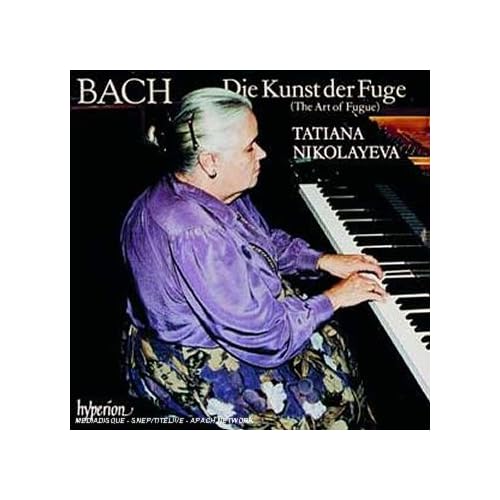
[Tatiana Nikolayeva]
But it's another piano version so I suggested a different instrument version. [By the way I really like Aimard -- in Ligeti -- but he has had bad reviews for his Art of Fugue - I have not heard his version and decided not to buy it].
I don't like listening to Organ on my hi-fi since it does not play it properly [you really need a real organ to get the really deep notes .. i.e. the room/church shaking .. I use Quad speakers]. But in any case I prefer the tone/sound of a piano [even to a harpsicord].
James H.
Way back in the thread I recommended the Emerson string quartet ... mainly as an alternative option to piano. [The Emerson say, by the way, [on the sleve notes] that they use a special viola] ...
But my favorite would be ...

[Tatiana Nikolayeva]
But it's another piano version so I suggested a different instrument version. [By the way I really like Aimard -- in Ligeti -- but he has had bad reviews for his Art of Fugue - I have not heard his version and decided not to buy it].
I don't like listening to Organ on my hi-fi since it does not play it properly [you really need a real organ to get the really deep notes .. i.e. the room/church shaking .. I use Quad speakers]. But in any case I prefer the tone/sound of a piano [even to a harpsicord].
James H.
Posted on: 03 May 2008 by u5227470736789439
Dear James,
I suspect that you would enjoy the Walcha set on the organ, not the least because he simply avoids using sofa shaking weight! Of course he is using a much less powerful organ than the type which could produce this kind of weight in the first place, and then he goes even further by using registration which completely avoids the risk of producing the kind of focus-muddling weight. The result is phenomenally lucid, and easily replayed with satisfaction on any replay device that can make a good job of the classical orcheatra. I have got tiny little Royd Minstrels, and these are fully up to the demands of Walcha's recording, and keep a splendid focus throughout all the contrapuntal lines. I can only imagine that Quad ESLs would be even finer!
Nicholeaeva is one of my pianistic heroes! Going on her performances of the Goldbergs, I would expect that she can really bring out the Art Of Fugue!
ATB from George
I suspect that you would enjoy the Walcha set on the organ, not the least because he simply avoids using sofa shaking weight! Of course he is using a much less powerful organ than the type which could produce this kind of weight in the first place, and then he goes even further by using registration which completely avoids the risk of producing the kind of focus-muddling weight. The result is phenomenally lucid, and easily replayed with satisfaction on any replay device that can make a good job of the classical orcheatra. I have got tiny little Royd Minstrels, and these are fully up to the demands of Walcha's recording, and keep a splendid focus throughout all the contrapuntal lines. I can only imagine that Quad ESLs would be even finer!
Nicholeaeva is one of my pianistic heroes! Going on her performances of the Goldbergs, I would expect that she can really bring out the Art Of Fugue!
ATB from George
Posted on: 04 May 2008 by JamH
Thanks George for the advice -- I will look out for this CD next time I am in town.
James H.
James H.
Posted on: 04 May 2008 by u5227470736789439
Dear James,
Though I could not find any excerpt from Walcha in the Art Of Fugue to show his wonderful style, and ability to get the clarity and sweep of the music through, here is an example from the stereo series of recordings [I have the mono set, which did not include the AoF], which gives some clue to his use of organs from Bach's time and his wonderful clarity of registration as well as his sense of spiritual commitment.
This is the Prelude and Fugue in C, BWV 547, one of the very last independant ones for Organ, and one of my favourites! The coolness of the opening of the Fugue after the dancing Prelude is deceptive - it is tremendous study in how to build tension and power without fireworks!
http://www.youtube.com/watch?v=uzhtUR2u6Xo
The CDs offer better quality than this Youtube transfer from aged LP!
Enjoy this! Best wishes from George
Though I could not find any excerpt from Walcha in the Art Of Fugue to show his wonderful style, and ability to get the clarity and sweep of the music through, here is an example from the stereo series of recordings [I have the mono set, which did not include the AoF], which gives some clue to his use of organs from Bach's time and his wonderful clarity of registration as well as his sense of spiritual commitment.
This is the Prelude and Fugue in C, BWV 547, one of the very last independant ones for Organ, and one of my favourites! The coolness of the opening of the Fugue after the dancing Prelude is deceptive - it is tremendous study in how to build tension and power without fireworks!
http://www.youtube.com/watch?v=uzhtUR2u6Xo
The CDs offer better quality than this Youtube transfer from aged LP!
Enjoy this! Best wishes from George
Posted on: 06 May 2008 by JamH
Thanks George for that .. I played the link and it's quite good. Also, as you say, it's not earth shatterring base. I really quite enjoyed it [even with just my computer speakers].
I might try to make a cd and play it with my real hi-fi.
In any case I will look out for his Art of Fugue.
James H.
I might try to make a cd and play it with my real hi-fi.
In any case I will look out for his Art of Fugue.
James H.
Posted on: 06 May 2008 by u5227470736789439
Dear James,
Do look at the Toccata and Fugue in F which is very much better transfered on my Great Music, Unarranged thread. You will get a much better idea of Walcha's unique concern with clarity over loudness with that. It is a mono recording, and honestly mono recordings survive the mauling of mp3 on Youtube much better than stereo for reasons I cannot explain.
Even then the CDs give a quality of playback that is so very much finer! I have the recording used there, and the [1956 stereo] Art Of Fugue CDs. You are in for a musical treat if you get them!
George
Do look at the Toccata and Fugue in F which is very much better transfered on my Great Music, Unarranged thread. You will get a much better idea of Walcha's unique concern with clarity over loudness with that. It is a mono recording, and honestly mono recordings survive the mauling of mp3 on Youtube much better than stereo for reasons I cannot explain.
Even then the CDs give a quality of playback that is so very much finer! I have the recording used there, and the [1956 stereo] Art Of Fugue CDs. You are in for a musical treat if you get them!
George
Posted on: 06 May 2008 by Oldnslow
I have no idea how "authetic" is Grigory Sokolov"s performance on piano (Naive) of the Art of the Fugue, but I know I like it a lot.
Posted on: 07 May 2008 by hungryhalibut
My Walcha CD has arrived and I must say it is way better than the clinical Aimard rendition. And it gives my nSats' fat friend something to do as well! When I was 17 and listening to the Pistols, Adverts, Stranglers etc, little did I suspect that 30 years later I'd be playing Bach organ music!!
Nigel
Nigel
Posted on: 10 May 2008 by u5227470736789439
Give us onw further consideration, please. It is so much a severe love of mime that I would so like to see a dispassionate endorsement!
Goerge
Goerge
Posted on: 12 May 2008 by Oldnslow
I just picked up the Walcha Art of the Fugue too and it is superb (as are the rest of the selections). There is another 2 CD set of Walcha currently available on DG too, and the two sets give a great overview of his work.
Posted on: 13 May 2008 by hungryhalibut
quote:Give us onw further consideration, please. It is so much a severe love of mime that I would so like to see a dispassionate endorsement!
George
As you know I hav been slowly accumulating a small selection of Bach CDs, largely folowing excellent recommendations from yourself and others here.
I have the violin sonatas and partitas, cello sonatas played on double bass, Hilary Hahn playing concertos, Angela Hewitt's well tempered clavier, Pinnock's Brandenburgs, and a few more besides. All have drawn me in immediately and I appreciated them from the off. But the Art of Fugue is proving very difficult. The Walcha is way better than the Aimard, but it somehow doesn't seem to hang together in a coherent way. I really like some parts, while others are mystifying. I don't know if this is known as one of Bach's more difficult works, but I am certainly struggling with it, and I really don't understand why. But I shall persevere!!
Nigel
